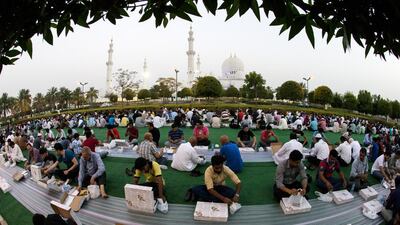There is a lot of information on how fasting changes behaviour. Can it be used for faith?
With just three weeks to go, Ramadan will begin almost before we know it. It feels deeply personal, an individual’s struggle against the self, that makes each person turn inwards and take a good hard look at themselves.
Yet despite the intensity of this individual focus, the paradox of Ramadan is that it is a wildly social month. If we zoom out from individual experiences we can see that behaviour changes en masse during the fasting month.
For example, food consumption goes up. Consumer spending rises. Shoppers notice that often prices also go up. Sometimes this even forces governments to intervene to avoid extortionate price hikes and food shortages.
In the digital space, spending on ecommerce rises. In fact, activity in general on social media is amplified, increasing around 30 per cent during the holy month. And this holiness seems to transpose itself into cyberspace. Interestingly, social media interactions become more positive, and even more surprising is that that positivity spills over after Ramadan.
It’s not just the sheer amount of online participation that changes – the very nature of our behaviour changes too. For example, online usage peaks either just before or just after suhoor, depending on the country and what time suhoor is. During the day time, online shopping replaces mealtimes. And guess what? More people are seeking cooking ideas and recipes online. Well, women are. The men appear to be online playing a greater amount of video games.
Once we start to realise these behaviour shifts during Ramadan, then we can move to influence them. Using this data, we can move from observing these changes, to actually improving our own experiences and those of the surrounding society.
These behaviour shifts discovered through data are usually highlighted in studies conducted by brands and businesses to prepare for the huge shift in consumer behaviour during Ramadan and Eid. And as long as they are doing it to be supportive and not exploitative then I believe that is in the interests of consumers. Where that line lies of course is up for debate.
The analysis of shifts in behaviour can offer real resources for other social institutions, particularly religious ones.
Identifying peaks and troughs in attitudes, emotions and behaviour can help them to amplify some of the positive changes, and tackle some of the challenges that Ramadan brings with it.
The holy month brings many positive changes in behaviour, and undoubtedly Ramadan brings its own challenges that need to be dealt with, while also exacerbating underlying issues.
With the increasing amount of information we have about how our societies change as a result of Ramadan, the more we can do to think more deeply about whether these are the changes we want, how we talk to believers and the faithful to maximise their experience of Ramadan and minimise any negativity. These issues might include: overeating and its negative effects on health, the possible exacerbation of mental illness, overspending, family tensions, food wastage and many more.
There’s the potential for interesting interventions – from health and well-being specialists figuring out the best times of the day and the month to push people to think of their health, through to religious scholars, both in physical congregations and those employing social and digital media, thinking about when and how to push followers on spiritual matters.
When can you push your audience to push themselves, when is their energy low and you can give them comfort, at what points do you need to warn them of challenges? Who needs most help and how do you deliver it to them? These are all questions for scholars to consider and data can help them do so.
Perhaps our social institutions rely on well-honed instincts to guide their audiences. But these resources are available to be put to fantastic use in communities that are already open to change and intervention.
What those who focus on spiritual intervention can do with a deep understanding of big data around spiritual behaviour will be fascinating to watch. And its impacts, just like the changes in social media usage, could continue long after the end of Ramadan.
Shelina Zahra Janmohamed is the author of the books Generation M: Young Muslims Changing the World and Love in a Headscarf


